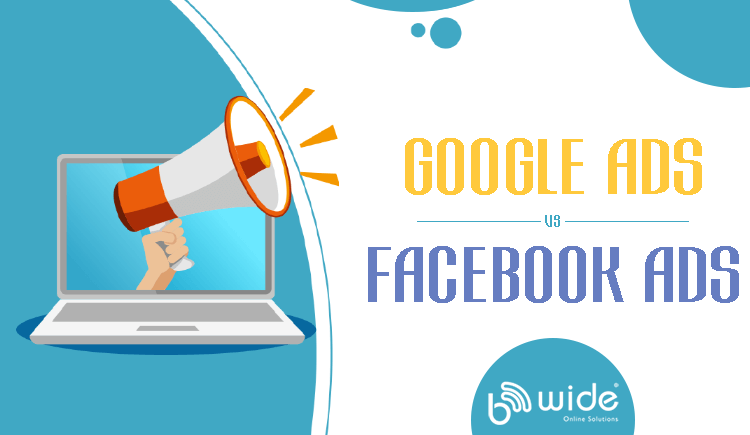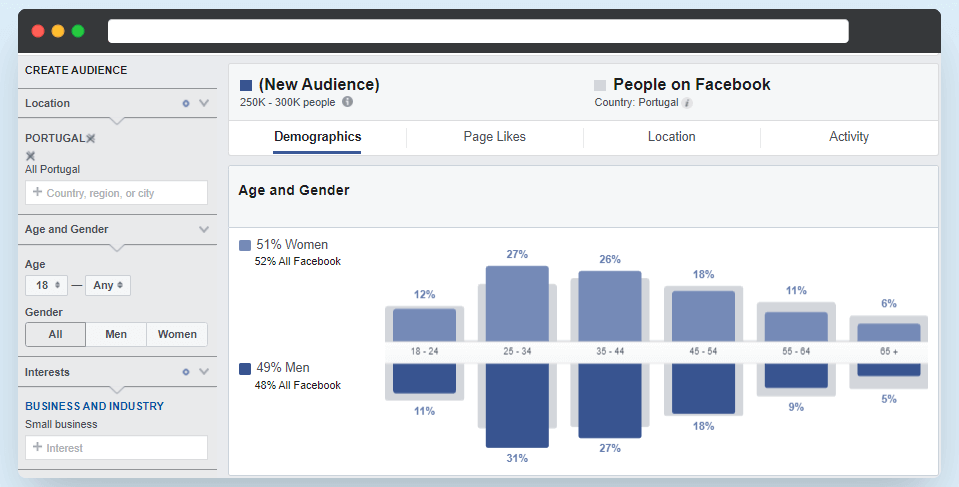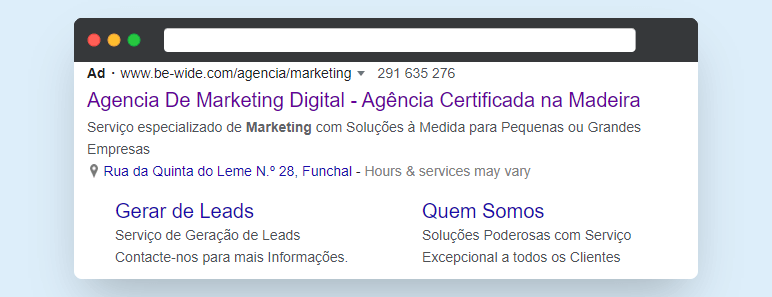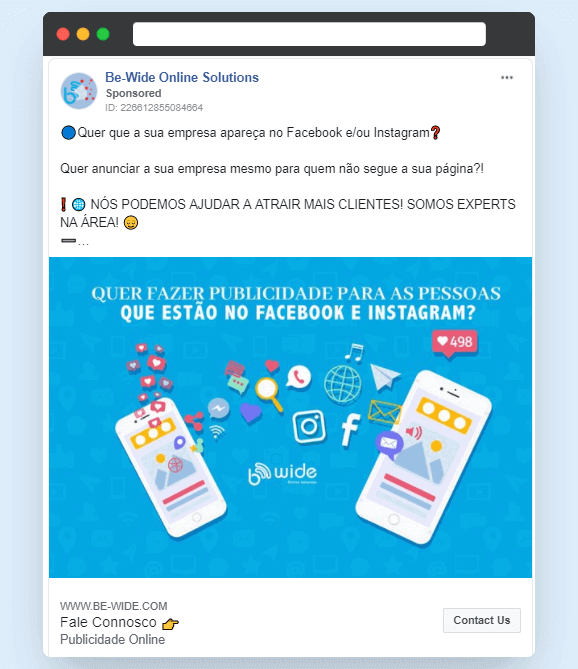Do you have a business or are you starting now, and want to ensure you gain visibility to ensure success? Google Ads and Facebook Ads can help.
Don't have the budget for both and need to choose just one? We are here to help! In this article we will point out the advantages, disadvantages and what you should keep from each of the ad platforms, making your choice easier.
Google Ads vs. Facebook Ads: What's the Difference?
First of all, it is important to understand what Google Ads and Facebook Ads are all about. If you are a user of the internet and social networks, namely Facebook, you certainly know those ads that appear from time to time on your computer monitor or on your cell phone screen, right? That's the ones Ads (English abbreviation for Advertisement or Advertisements in Portuguese). But anyway, how do they work? How can your business suddenly appear like this on the screens of other people's devices?
When we try to create an ad on any of the platforms, we enter a auction with other advertisers for the available advertising space. So, you will be charged a certain amount of money (later) each time someone clicks on one of your ads, or views them. – depending on your objectives and measurement methods. Sounds simple, right?
Now, the main question: Google Ads or Facebook Ads? Let's see the differences, category by category:
1. Audience Reach
Both Google and Facebook have a huge reach – Google handles over 5.8 billion searches every day, while Facebook has an estimated 1.73 billion daily active users.
On Facebook, mobile advertising revenue makes up approximately 90% or more of some businesses' profit.
look here more Statistics about Facebook Ads.
That said, mobile advertising is certainly not an opportunity you want to run away from!
Most likely, your target audience is on both platforms, making it difficult to determine the right fit for your business based on audience size alone.
Instead, ask yourself these questions: Is my target audience active on these networks? My product is research-oriented – that is, are my customers actively looking for it? These are usually need products. Or is it more social oriented? These are usually desire products emotional.
Even though Google has 5.8 billion searches a day, it won't help you if no one is actually researching your specific product.
Are you launching a new and innovative product? Have people heard of what it offers? If the answer is 'no', then Facebook is often a better option to get the word out.
2. Buyer's Intent
When it comes to purchase intent, Google ads are almost always better than Facebook ads. Consider what type of business you have: do people tend to look for your product or service when they are ready to make a purchase?
For example, if a person's air conditioner breaks down, they immediately start looking for a repair business. Search ads would put your business in front of a potential customer at the exact moment they need your service.
On the other hand, that person won't remember the repair business they saw on Facebook three months ago. In this scenario, Google ads would be a clear winner.
But people generally go to Facebook to relax and socialize, not to shop. Think about your own case: when you want to find a service you need, do you first turn to Facebook or Google to look for it?
The truth is that vast majority of people turn to Google and, often, from there they arrive at the profile company's or brand's Facebook page.
That said, Facebook is still essential to building your audience. If you can create a sense of community on social media, people will be much more likely to buy when they need your service or product.
Therefore, if the goal of your campaign is to build brand awareness, Facebook Ads may be the best choice.
3. Targeting Options
Both Google and Facebook give you targeting and redirecting options for specific audiences. On both platforms, you can segment your target audience by age, gender, location, income level, among other factors.
However, the Facebook is the winner for advanced targeting options. In addition to the aforementioned targeting options, Facebook allows you to create audiences based on a large list of interests and behaviors, thanks to the wealth of information it collects from its 2.6 billion monthly active users.
In the image above we see Facebook Audience Insights, where we can create segmentations at the level of location, interests, and other factors in order to explore data about that same audience.
It's an interesting practice to do, since we can find interesting data about our audience using the tool.
Explore a Ferramenta de Audience Insights do Facebook
Note: You will need access to a Facebook business account. He can create one here.
Here is a interesting article that addresses Facebook Audience Insights.
With Facebook, you can be very specific with your audience. If the target audience is very specialized, then Facebook Ads will be a great option for your business.
Facebook even allows you to create custom audiences and lookalike audiences, which although more advanced tactics, generally optimize the results obtained.
The lookalike audience, or lookalike audiences, allow you to reach people who are similar to a real audience you choose (eg your buyers in the last 30 days!). Facebook uses your existing data to match your customers to similar users, which can be a very powerful option for advertisers.
It is worth reading this guide and learn more about the Similar Audiences option on Facebook Ads
4. Ad formats
What about ad formats? This brings us back to the central question: what is the purpose of your campaign?
You certainly have more creative freedom on Facebook, which makes it a much better platform to build brand awareness and customer loyalty.
About the Google Ads has, as a general rule, a small block of text to draw the attention of potential customers to the SERPs (Search Engine Results Page), in which the pages corresponding to the search intent of the user, according to the terms used in the search.
Not mastered the concept and features of SERPs? You can learn more here.
As a general rule, your ads will be placed in the top positions of search results, however, other placements are constantly tested by Google.
You can use ad extensions and additional information, but generally speaking, their format will be limited to text in search ads.
You should always look to use ad extensions, as they generally improve your results. Learn all about Google Ads ad extensions here.
Already in Facebook, you can add visual impact to your message using image- or video-based ads. Facebook also continues to feature various ad formats to avoid “ad fatigue”. You can even choose to use videos or animated images (gifs). If you are an e-commerce business, the visual component of Facebook must be taken into account in the uphill battle between Google Ads vs. Facebook Ads.
Advanced Tip: Use Facebook Ad Library to search for active ads on specific pages. You can easily spy on your competition or find some inspiration in general – both in terms of copy and in terms of design.
But then, should you choose Google Ads or Facebook Ads?
Final question: Google Ads or Facebook Ads? To decide, here are some questions to reflect on, in order to facilitate your decision:
1 – What are the campaign objectives? Are you focused on making more sales as quickly as possible?
2 – What is your customer's activity? Is your business B2B or B2C?
Don't know the difference between B2B and B2C? Basically the terms mean “Business-to-Business” and “Business-to-Consumer” and serve to describe the type of activity of your company. Learn more about these terms and their differences here.
3 – Are people looking for your business or service with a prior intention to buy?
4 – Finally, what is your budget and your level of technical competence?
Did you draw your conclusions? Excellent! Now, we explain…
Regarding the first question, if your campaign goals are focused on making more sales as quickly as possible, Google Ads is the best choice. If, on the other hand, you are looking to expand brand awareness or reach a wider audience, Facebook Ads may be the best choice.
Regarding the second question, both B2B and B2C companies successfully use Google Ads. Facebook Ads often work best for B2C companies, especially those selling less expensive items, as they people are more likely to buy impulsively these products after being exposed to them a few times. However, even for B2B there will be opportunities in Facebook Ads, especially due to the great capacity remarketing on the platform and also to powerful targeting features such as ‘’lookalike audiences’’.
To the third question, are people looking for your business or service with a prior intention to buy? If so, Google Ads will likely yield better results. But if on the other hand you're trying to build your audience for a new product, Facebook Ads will usually work better.
Finally, answering the fourth question, if you have money to invest, even if you are in a competitive industry: Google Ads. If you have the ability to create (or subcontract) visually rich ads (image or videos): Facebook Ads.
To further facilitate your decision and your understanding of the subject, we have created a table with the appropriate conclusions of this Google Ads vs. Facebook Ads.
| Google Ads | Facebook Ads |
| If your campaign objective is centered around making more sales as quickly as possible. | Whether looking to expand brand recognition or reach a wider audience. |
| If your business is B2B (Business to Business) – NOTE: Facebook Ads can also work quite well. | If your business is B2C (Business to Consumer). |
| If people are looking for your business or service with the intention of buying. | If people still don't know your business or service and, consequently, will have no intention of buying initially. |
| If you have money to invest, being in a competitive industry. | Whether you have the ability to create or subcontract visually rich ads. |
We are Experts on Both Platforms
Our agency uses both platforms, both Google Ads and Facebook Ads, daily to generate results in our clients' businesses.
If it's difficult for you to master one or both platforms, you can count on us. We're here to help capitalize on the power of digital ads for your business.
Consult our Facebook Ads services and Google Ads for more information about the services we make available daily to our customers.
All businesses gain tremendously from the power of digital ads. You will be no exception! Contact us to see your leveraged results.






